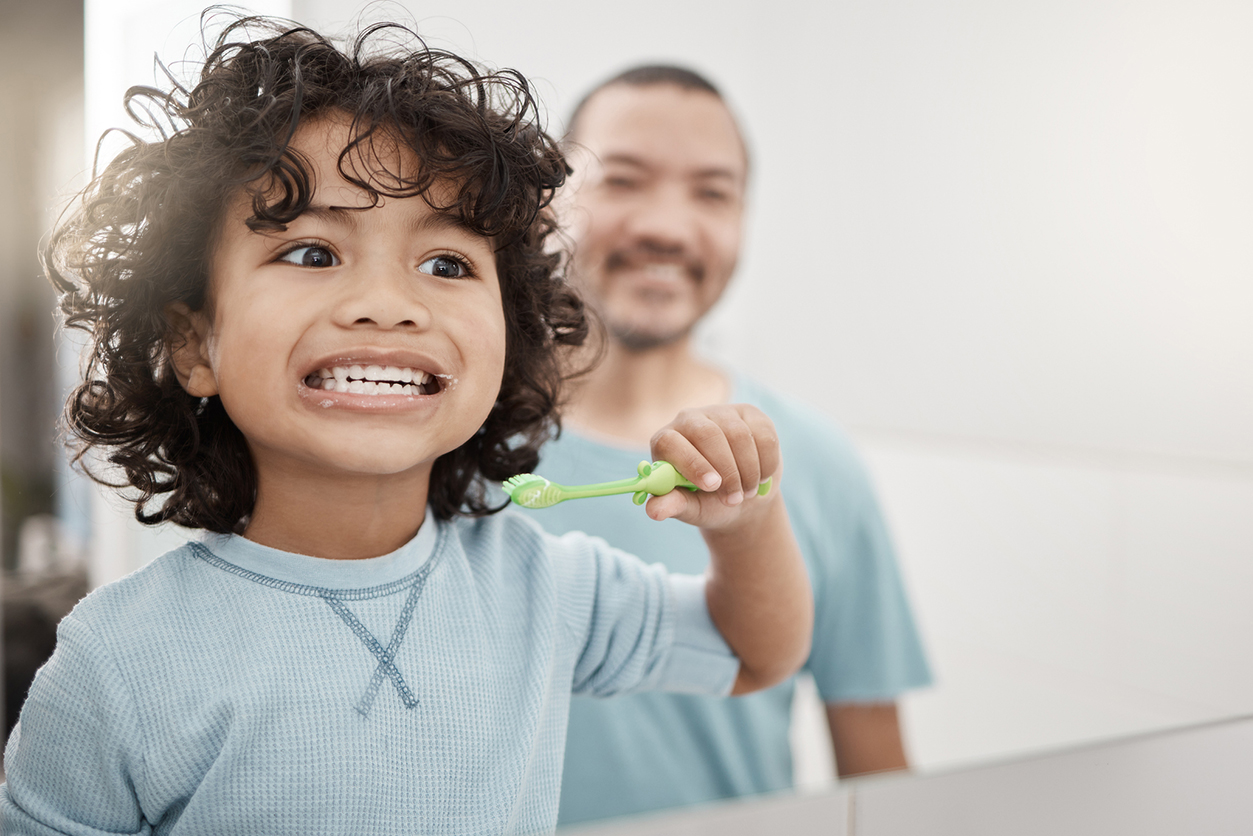One of the many milestones your child will go through is getting their baby teeth and, eventually, their permanent teeth. While many of us shrug off the importance of baby teeth, we cannot stress this is enough; baby teeth do matter. One of the most important reasons to care properly for your child’s baby teeth is to teach them good dental habits from a young age. This helps create life-long healthy habits.
Creating Healthy Habits Young
Building healthy dental habits should begin as soon as your child’s first tooth appears. Start by cleaning your baby’s teeth with a soft, damp cloth or an infant toothbrush. Use a tiny smear of fluoride toothpaste about the size of a grain of rice. As more teeth come in, gradually increase the amount of toothpaste to a pea-sized amount by age three. This is also an excellent time to take your child in for their first dental visit. Starting your kiddos young ensures they build a trusting and happy relationship with their dentist.
Teaching Your Child to Brush and Floss
As your child grows, it is crucial to begin teaching them how to brush and floss their teeth properly. While mom and dad can still help, it’s a good idea to allow your child to begin practicing using their toothbrush from a young age.
Brushing their teeth should be a part of your child’s daily routine. Show them how to brush their teeth in gentle, circular motions, covering all surfaces of the teeth and gums. Then, allow them to try on their own. Brushing should last for about two minutes twice daily.
Introduce flossing when your child’s teeth start to touch each other. Use child-friendly flossers to make the process easier. Demonstrate how to gently slide the floss between their teeth and curve it around each tooth to clean below the gum line.
Children typically develop the dexterity to brush and floss on their own by the age of six or seven. However, it’s important to supervise their brushing and flossing until you’re confident they can do it effectively on their own. Encourage independence by gradually letting them take over more of the process while you observe and guide them as needed.
Making Brushing Fun
Transforming toothbrushing into a fun activity can motivate children to maintain this essential habit. Here are some ideas:
- Use fun toothbrushes, such as those with their favorite characters or in bright colors
- Play a two-minute song to signal the length of brushing time and be sure the song is fun and that they enjoy it
- Create a reward chart where they can add stickers each time they brush their teeth
- Turn brushing into a story about battling “sugar bugs” or keeping their teeth shiny for a special reason
Handling Their First Baby Tooth Loss
Losing their first baby tooth is a significant milestone and can be an exciting time for both children and parents. Here’s what to expect:
- Most children lose their first tooth around the age of six
- Teeth usually become loose due to the underlying permanent teeth pushing them out
- Encourage your child to gently wiggle the tooth if it’s loose, but never force it out
- Once the tooth falls out, reassure your child that a bit of bleeding is normal
- Have them rinse their mouth with water and place a piece of gauze over the area if needed
Milestones to Watch For
- First Tooth – Generally appears between 6-12 months. Schedule their first dental visit by their first birthday.
- Complete Primary Teeth – By age three, most children will have their complete set of 20 primary teeth.
- First Permanent Molars—These usually emerge around age six, marking the beginning of the mixed dentition phase (having both baby and permanent teeth).
- Losing Primary Teeth – Typically starts at age six and continues until age twelve. Learn more about baby tooth loss here.
Remember, that every child is unique and it’s okay if your child is slightly behind or ahead of these milestones. Always consult your dentist if you have any concerns about your child and these important milestones.
Remember, Baby Teeth do Matter
Establishing good dental habits early in life is essential for ensuring children have healthy teeth and gums as they grow. By teaching proper brushing and flossing techniques, making the process enjoyable, and being mindful of important dental milestones, parents can help their children develop a positive attitude towards oral hygiene that will last a lifetime. Regular dental check-ups and a balanced diet are crucial in maintaining dental health, ensuring that those early lessons have a lasting impact.
Find more information on frequently asked questions about baby teeth here.

